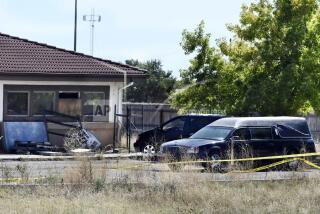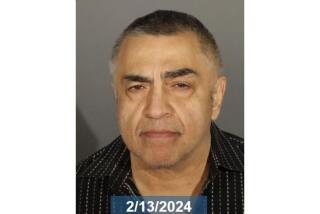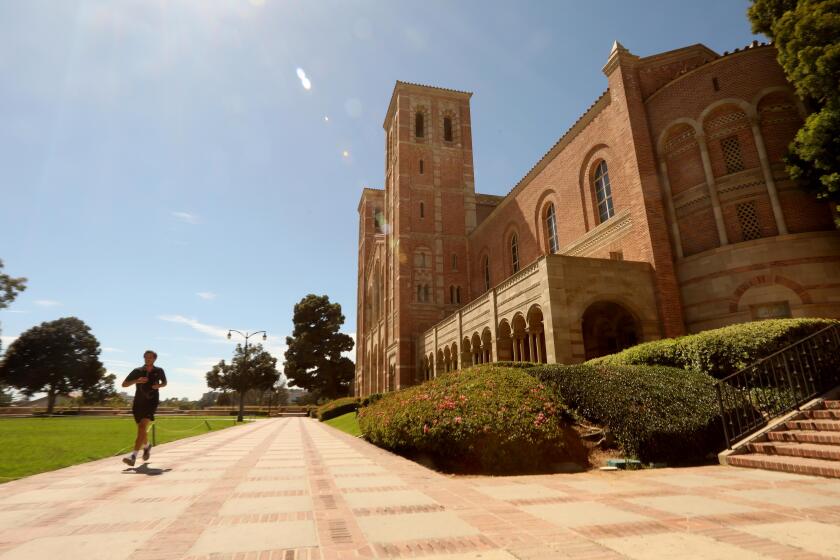âFuneral-Home Kidâ Lands at Center of Scandal
For six years, Ernest V. Nelson says, he arrived at the walk-in refrigerator of UCLAâs willed body program toting a gray case filled with gloves, specimen bags and a power saw.
âI cut cadavers for a living,â said the burly man with a shiny, shaved head. âIâm the best in the business.â
While he sawed off legs, feet and hands on an embalming table, Nelson said, medical students, doctors and other âlooky-loosâ would gather around to see his work. Afterward, staffers would help him load the plastic-wrapped body parts in his van. It was routine and authorized, he said. Authorities disagree.
Nelson, 46, is at the center of a widening probe into the alleged sale of donated body parts from UCLAâs willed body program. UCLA police raided his house in Rancho Cucamonga on Sunday and arrested the father of five. He was charged with possessing stolen property -- namely body parts. After posting bail, he was released.
Nelson grew up around dead bodies. Raised in Arkansas, he helped his godparents run a string of funeral parlors. At the age of 12, he collected trash, cleaned toilets and dug graves.
âIâm what you call a funeral-home kid,â he said.
Now, Nelson is suspected of illegally profiting from sales of body parts, along with Henry Reid, the director of the willed body program, who was arrested Saturday and charged with grand theft.
Nelsonâs Claremont-based attorney, Greg Hafif, said UCLA officials knew about his clientâs activities. Nelson said his work benefited science, because he provided the body parts to medical research companies.
His arrest has opened a window into a small, but indispensable, part of the booming human-tissue industry. Body parts are in great demand by universities and private companies, which use them for medical research.
Though it is illegal to profit from selling body parts, tissue brokers are allowed to charge reasonable fees. Nelsonâs attorney said that Nelson did not charge for the tissue, only for his handling, storage and other fees.
One UCLA pathology department worker, who is familiar with Nelsonâs work, said his activities were not as open as he claims.
Arriving in jeans and work boots, the middle-aged Nelson stood out among the young medical students on campus, said the worker, who spoke on condition of anonymity. âYou couldnât miss him. Itâs like Suge Knight coming into a day-care center,â said the person, referring to the gangsta rap impresario. âBut he was real quiet and secretive.â
Sometime after graduating from high school in 1975, Nelson moved to California. He studied one year at a mortuary school in Cypress and became an autopsy technician at Good Samaritan Hospital and other hospitals. In 1989, he started a business transporting bodies for mortuaries.
Around that time, a company he was associated with ran into financial trouble and lost a $90,000 judgment in a rent dispute, according to court documents. The leasing company accused Nelson and his associates of using the identities of dead people to qualify for the lease, the documents showed. Nelsonâs attorney said Nelsonâs brother-in-law ran the business, and that Nelson wasnât aware of the judgment.
Nelsonâs business fortunes improved dramatically in 1997, when he became a tissue broker and gained access to a regular supply of body parts through an employee of Johnson & Johnson, who introduced him to an employee at the UCLA willed body program, according to a letter written by Hafif.
His business, Empire Anatomical Services, grew rapidly. He was handling as many as 175 cadavers per year from UCLA, paying about $1,400 per body, according to invoices and legal documents. His client list grew to about 100 corporations, some of them âgiants,â Nelson said. He also shipped body parts to foreign companies.
He was visiting the cold-storage room twice a week, he said, typically in the late mornings. Among his first stops during his three-hour visits was the walk-in refrigerator. There, the embalmed cadavers were tagged and hung by their ears from rod-like devices in 38- to 40-degree temperatures, according to a description Reid, the director, gave in a deposition. The bodies would be removed and taken to the adjoining embalming room.
Nelson, using his saw, scalpels and scissors, cut up the bodies, placing some of the pieces in small coolers. His work drew onlookers, he said, including officials of the medical school.
UCLA attorneys have cast doubt on that claim, saying Nelson has exaggerated his work. Nelson said it would have been impossible for officials not to know what he was doing.
âI donât have the clout to get a dead human body and cut it without somebody giving me permission,â Nelson said.
But UCLA lawyers suggest that Nelson may have fabricated some invoices that his attorney has offered as evidence that the visits were authorized. The unsigned invoices on UCLA letterhead indicate that Reid billed Nelson $704,600 for 496 cadavers over a six-year period.
Nelson has fallen on hard times since the probe was launched last year. His Rancho Cucamonga house is up for sale to avoid foreclosure, Hafif said.
Times staff writers Jose Cardenas, Matt Lait and Alan Zarembo contributed to this report.
More to Read
Sign up for Essential California
The most important California stories and recommendations in your inbox every morning.
You may occasionally receive promotional content from the Los Angeles Times.











